Edie Melson's Blog, page 10
July 3, 2025
How does a comp title help a self-published book’s marketing plan?
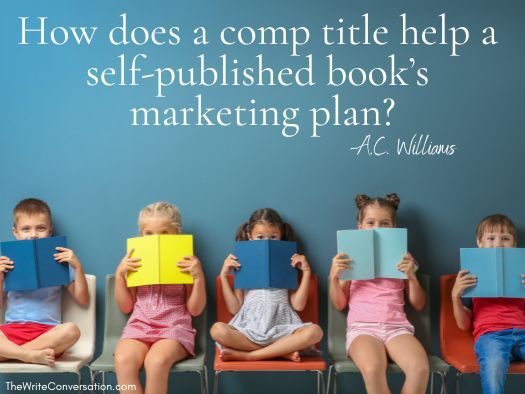
by A.C. Williams @ACW_Author
You already know you’ve written the best book ever, but the most difficult step is to get everyone else to realize that it’s the best book ever. So how do you do it? How can you convince someone to read your book? That’s the tricky part.
So far in this series on self-publishing, we’ve talked about setting your goals, understanding your legal rights as a self-published author, ISBNs, and distribution channels (Links to all the posts are at the bottom). This month, we’re going to focus on an element of self-publishing that may not even be on your radar: Market Research.
When you decide to self-publish your book, you are basically agreeing to become the primary decision maker in every aspect of your book’s future. It’s not just producing a high-quality book that will be competitive in the industry, and it’s also not just making sure the distribution channels are open so that your book can even get to your readers. Self-publishing includes your marketing plans, your promotional strategies, and your author branding too.
In many instances, you can hire a professional to help you with any marketing that needs to be done, but a marketing expert can only help you with so much. If you don’t have a firm grasp on what your book is about or why someone should read it, you’re going to struggle in any promotional communications.
So how do you do it? How do you capture a potential reader’s attention when the average reader’s attention span is rapidly diminishing? A quick Google search says that a person’s attention span is around 8 seconds.
Eight seconds? That’s unreasonable. But if we only have 8 seconds to catch someone’s attention, how do we make the most of each one of those moments in time?
Every audience is different. Every reader wants something unique most times. And readers hesitate to pick up a new-to-them author because they aren’t sure if they can trust it. But how can you address those concerns in eight seconds?
In my experience, the best strategy you can use to help a new reader decide if your story is right for them is a handy-dandy, helpful little literary device called a Comp Title.
Comp Titles, or comparative titles, are usually an important part of a book proposal. Providing a list of books similar to your own that are already published and successful in the industry is a great way to research not only what is currently working but also different options for promotion.
For example, the book Cinder by Marissa Meyer is a fairytale retelling set in a futuristic society. The main character is part cyborg and works as a mechanic to support her stepmother and stepsisters. The story culminates with a tension-filled confrontation at a ball where the main character attends as the special guest of the prince.
All right? That’s 54 words total. You could go through all of that to explain what Cinder is about. Or you could simply say:
It’s a Cinderella retelling in space!
Six words. The book Cinder is a unique combination of multiple different fairytale elements all ingeniously jumbled together with the space opera genre, but the best way to get someone’s attention at the very beginning is to explain the story in the terms of a story people already recognize. That’s all a comp title does.
Another fantasy book I enjoyed thoroughly was Spin the Dawn by Elizabeth Lim, a brilliant fantasy adventure story that combines elements of Disney’s Mulan and the fashion reality show Project Runway. Two completely different existing stories combined to explain a totally unique new story.
So what about your story? How can you identify the unique story elements that exist within it in order to find a comp title that will work for you?
Well, first of all, you really need to read. A lot. If it’s possible, you need to read more than you write. It’s the only way to know what is current in the industry. It’s the best way to keep up with popular author voices too. But it also teaches you what publishers are putting out into the market, which can give you an idea of what readers actually want.
Consider Your Tropes
What tropes do you use in your story? Enemies to lovers? Friends to lovers? Grumpy/sunshine? Forbidden love? Second chance romance? Curmudgeon and cute child? Orphaned protagonist? Noble hero with a tragic past? Magical MacGuffin?
You may even have tropes in your story that you don’t realize. Ask a well-read friend to help you sort them out. Once you have identified the tropes you are using, see if you can find a comparable already-published book you can use.
Consider Your Plot
What happens in your story? Is it a heist? Is it a quest for an object? Are your characters preparing for an event?
Think about the plot you have designed and see if you can identify similarities between it and other books that are already on the shelves.
Consider Your World
Is your story set in space? Is it a Hallmark-style story? Is it an epic fantasy? Is it focused on a specific culture like ancient Greece or Rome, feudal Japan, colonial America?
You can always integrate the setting of your story in your comp titles.
Those are just a few of the ways you can sort through the myriad comp titles for your fiction books. But if you find the right one, you will be able to connect with potential readers in only a few words. Once you have their attention, then all you need to do is wow them with your story.
TWEETABLEHow does a comp title help a self-published book’s marketing plan? from @ACW_Author on @EdieMelson (Click to Tweet)
Don't Miss the Rest of the Posts in This Series on Self Publishing: PART 1: WHY DO YOU WANT YOUR BOOK TO BE RE-PUBLISHED? PART 2: WHY CONTRACTS MATTER IF AN AUTHOR PLANS TO SELF PUBLISH PART 3: DO I NEED AN ISBN IF I SELF-PUBLISH MY BOOK? PART 4: HOW DO I DELIVER MY SELF-PUBLISHED BOOK TO A READER? PART 5: HOW DOES A COMP TITLE HELP A SELF-PUBLISHED BOOK'S MARKETING PLAN?
 A.C. Williams, also known as Amy C. Williams, is a coffee-drinking, sushi-eating, story-telling nerd who loves cats, country living, and all things Japanese. Author of more than 20 books, she keeps her fiction readers laughing with wildly imaginative adventures about samurai superheroes, clumsy church secretaries, and goofy malfunctioning androids; her non-fiction readers just laugh at her and the hysterical life experiences she’s survived. If that’s your cup of tea (or coffee), join the fun at www.amycwilliams.com.
A.C. Williams, also known as Amy C. Williams, is a coffee-drinking, sushi-eating, story-telling nerd who loves cats, country living, and all things Japanese. Author of more than 20 books, she keeps her fiction readers laughing with wildly imaginative adventures about samurai superheroes, clumsy church secretaries, and goofy malfunctioning androids; her non-fiction readers just laugh at her and the hysterical life experiences she’s survived. If that’s your cup of tea (or coffee), join the fun at www.amycwilliams.com.
Published on July 03, 2025 22:00
July 2, 2025
Adventuring in Utah Gave Me Insight into Important Writing Truths: Part 2 Take it Slow and Don’t Grab the Reins
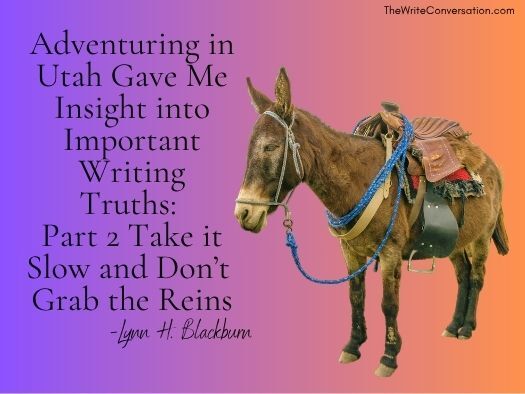
by Lynn H. Blackburn @LynnHBlackburn
This month, we’re continuing my 5-part series on Utah’s Mighty 5 National Parks. Last week we were in Zion National Park. This month, we’re in Bryce Canyon. (Links to previous posts at the bottom)
Bryce Canyon National Park is home to the world’s largest collection of hoodoos—tall, thin spires of rock carved by water, ice, and gravity. The hoodoos are everywhere, and they create a landscape unlike anything I’ve ever seen!
When we arrived at Bryce Canyon, we took the Queen’s Garden trail to the Navajo Loop. The Queen’s Garden Trail takes you to the canyon floor, and while it is the less steep route down, it still requires some careful walking in order to maintain control.
There were several areas where we had to lean back as we walked, take short steps, and keep our eyes focused on the trail. When we reached the bottom, we walked around a bit before joining the Navajo Loop trail for the hike back to the top. And that’s when the fun really began. Because the Navajo Loop is mostly steep switchbacks that keep going … and going … and going…
You might be wondering why we wouldn’t take the steeper path down so we could have an easier hike out? Well, it turns out that while you can hike down the Navajo Loop and back out via the Queen’s Garden, they (whoever ‘they’ are) strongly discourage it for a very interesting reason:
The steeper the descent, the greater the risk of injury.
It turns out that when you hike down the steeper trail, you’re more likely to sprain your ankle, tear your ACL, or experience the road rash that comes from slipping as you traverse the switchbacks.
And wouldn’t you know it, the same is true for our writing life!
It’s so tempting to find the easiest path to publication, but very often that path will lead to injury. Submitting too early to an agent could make that agent less likely to be interested in working with you down the road.Publishing before the manuscript is ready could lead to brutal reviews, poor sales, and future rejections. Committing to a course of action before you understand all your options could limit your future earnings and damage your career path.
How much better would it be to take the gradual approach—learn from multiple teachers, read widely, experiment with different writing styles, and build your writing community before you charge into publication?
Then, when it’s time to move onto the arduous publication path, you’re ready!
It’s so much easier to keep putting one foot in front of the other when you’re healthy in mind, body, and spirit. When you know it’s going to be tough, but you’re ready. When you have the friends around you, the writing experience under your belt, and the confidence that has come from smaller wins.
Now, please hear me! I know it can be hard to take advice like this. But this is one of those times when trusting the people who have experience is crucial. The writing mentors in your life who have seen it all and lived to tell the tale can spare you a great deal of heartache.
I had this point driven home on our second day in Bryce Canyon when we took a mule/horse ride into the canyon and around the Peekaboo Loop.
Fun fact: Putting a control freak on the back of a mule and sending that mule down steep switchbacks makes for a very unpleasant time for both the mule and the rider. My mule’s name was Matthew. Given that I lived to tell the tale, you can rest assured that dear old Matt knew his business. He could walk those canyon paths in his sleep. Matt knew the best places to put his feet and the best angle to take the hairpins.
But that didn’t keep me from trying to help him out. Sweet mercy. I spent half the ride praying and the other half cajoling Matt to, “Please, for the love of all that is holy, don’t kill me.”
Fun fact: My husband and boys loved the ride because they didn’t spend the whole time trying to argue with a stubborn mule! They trusted their mule and horses, and because they did, they had a blast. I, on the other hand, spent the three hours in so much tension that I needed a handful of ibuprofen and a hot shower before I could even begin to relax.
Don’t do what I did!
I’m not saying the writing experts around you are mules…so don’t you go saying that’s what I said!
I am saying that there’s a lot of wisdom in the people who have walked the path before you. And when they say things like, “Slow down.” Or, “It’s too soon.” Or, “Trust the process.” Or, “This might seem slower, but it’s the best approach,” you should listen.
If you do, you’ll get where you’re going safely and probably have a great time doing it!
Grace and peace,Lynn
Next month, we’ll be visiting Capitol Reef National Park … isolated, underappreciated, and humbling. Just like the writing life!
TWEETABLEAdventuring in Utah Gave Me Insight into Important Writing Truths: Part 2 Take it Slow and Don’t Grab the Reins @LynnHBlackburn on @EdieMelson (Click to Tweet)
Don't Miss the Rest of the Posts in Lynn's series, Adventuring in Utah Gave Me Insight into Important Writing Truths Part 1: The Brutal Beginning Part 2: Take it Slow and Don't Grab the Reins
 Lynn H. Blackburn is the award-winning author of Unknown Threat, Malicious Intent, and Under Fire, as well as the Dive Team Investigations series. She loves writing swoon-worthy southern suspense because her childhood fantasy was to become a spy, but her grown-up reality is that she's a huge chicken and would have been caught on her first mission. She prefers to live vicariously through her characters by putting them into terrifying situations while she's sitting at home in her pajamas! She lives in Simpsonville, South Carolina, with her true love, Brian, and their three children. Learn more at www.lynnhblackburn.com.
Lynn H. Blackburn is the award-winning author of Unknown Threat, Malicious Intent, and Under Fire, as well as the Dive Team Investigations series. She loves writing swoon-worthy southern suspense because her childhood fantasy was to become a spy, but her grown-up reality is that she's a huge chicken and would have been caught on her first mission. She prefers to live vicariously through her characters by putting them into terrifying situations while she's sitting at home in her pajamas! She lives in Simpsonville, South Carolina, with her true love, Brian, and their three children. Learn more at www.lynnhblackburn.com.
Published on July 02, 2025 22:00
July 1, 2025
A Love Letter to Writing
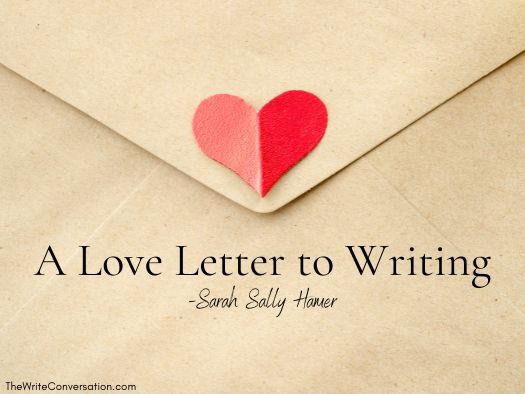
by Sarah Sally Hamer @SarahSallyHamer
Why do we write? Why do YOU write?
Sometimes, especially when I’ve just gotten a rejection letter or a bad review, or someone has scribbled edits across a manuscript, I wonder why I write. Why do I stick the rejection letter into a file and go write something else, or take a big, deep, cleansing breath and start working through the red ink?
Because writing soothes my soul.
I’ve been “writing” even before I could put words on paper. My folks often told me that my imagination would get me into trouble—and, unfortunately, in some ways they were very right! But creating stories, playing with dolls, puppies, other children, and making up situations of all kinds was how I reconciled a world I didn’t understand as a child. Not that almost every child doesn’t put on a mask and cape and pretend to be a superhero. Yes, we all do. It’s a part of growing up.
But, like Peter Pan, I wanted to stay in that magical, fairy world, where I had sovereignty over events. Everything was an adventure. Everything was fun and exciting. And, everything was a place where I could create a happy ending.
Of course, I had to grow up and take responsibility for my life, but that doesn’t mean the little girl with goggles and a magic screwdriver who loved dragons and mermaids doesn’t still exist in me. And writing stories is the perfect way for me to express those things.
Remember, writing isn’t just about font choices and caffeine dependency. It’s a superpower, something that makes us soar above the clouds. With just 26 letters and a bit of nerve, writers can build entire universes, break hearts, or make readers snort-laugh coffee out of their noses. We writers have the ability to change lives, simply by writing about our own. We make people laugh and cry without even knowing them. We share our loves, our hates, our dreams, putting them out into the world with courage and commitment.
Yes, writing can be a treacherous path littered with plot holes, rogue commas, and the existential dread of realizing you just used the word “just” fourteen times in one paragraph. People, some of them considered experts, have arrows that slice through our skin, creating wounds that can affect us for years. Editing a story to fit into a genre can be like tearing down your house to find the amazing cottage that exists inside it.
And, sometimes, we will even give up on our dream of writing—life intrudes! We can lose the wonder of how a perfect sentence can punch, sing, or sparkle just right, where we find both joy and excitement, knowing it’s perfect, like a newborn idea wrapped in ink and hope.
Don’t let that happen! Please! Don’t allow yourself to not create magic. We all have times when we don’t have the energy to allow the words to come. But it’s like an iris. The bulb of this beautiful flower has to go through a process of renewal every year. From the cold ground when it lies dormant, to the warmth of the sun on the dirt allowing it to slowly awake, to the single stalk and the blooms of purple and gold and blue (depending on the variety, of course), the creation happens in the proper time and place, when inspiration is nurtured.
How do you nurture your own creativity? How do you allow yourself to rediscover the magic and joy of your imagination? What are your soul-fulfilling and stimulating secrets?
TWEETABLEA Love Letter to #Writing from @SarahSallyHamer on @EdieMelson (Click to Tweet)
 Sarah (Sally) Hamer, B.S., MLA, is a lover of books, a teacher of writers, and a believer in a good story. Most of all, she is eternally fascinated by people and how they 'tick'. She’s passionate about helping people tell their own stories and has won awards at both local and national levels, including two Golden Heart finals.
Sarah (Sally) Hamer, B.S., MLA, is a lover of books, a teacher of writers, and a believer in a good story. Most of all, she is eternally fascinated by people and how they 'tick'. She’s passionate about helping people tell their own stories and has won awards at both local and national levels, including two Golden Heart finals.A teacher of memoir, beginning and advanced creative fiction writing, and screenwriting at Louisiana State University in Shreveport for over twenty years, she also teaches online for Margie Lawson at www.margielawson.com and for the No Stress Writing Academy at https://www.worldanvil.com/w/classes-.... Sally is a free-lance editor and book coach, with many of her students and clients becoming successful, award-winning authors.
You can find her at info@mindpotential.org
Published on July 01, 2025 22:00
June 30, 2025
A Writer Can Rely on the Unreliable Narrator POV
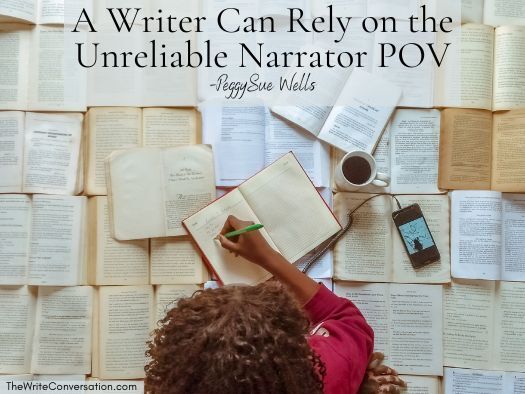
by PeggySue Wells @PeggySueWells
Point of View signifies who is telling or narrating the story.
Occasionally, the reader is surprised to discover that the narrator is far from reliable. Yes, the narrator is relaying the tale but their POV is skewed. The slant can be caused from a variety of reasons.
Impaired Memory
Perhaps the narrator's memory is declining due to a long expanse of time between the event and the telling. Maybe the character is experiencing dementia or the onset of Alzheimer's.
Biased Opinion
The storyteller may have a strong motivation to tell the story with a calculated slant to manipulate the reader to believe, feel, and think a specified way about characters and events.
Mental Illness
Mental illness will color a storyteller's perspective of a story. Narrators who are narcissists, sociopaths, psychopaths, have borderline personality disorder, or disorganized personality disorder will see the events, people, and the world differently from the rest of society who fall within the parameters of normalcy. A mentally ill narrator is a storytelling device leveraging a character's psychological instability and perception of reality to impact the narrative. This device is seen in the film One Flew Over the Cuckoo's Nest , and in the books The Girl on the Train by Paula Hawkins, and Gone Girl by Gillian Flynn.
Mentally Impaired
People who have low or slow intelligence levels, young children who are naive, those unfamiliar, ignorant, or innocent regarding the setting they are in will be less than reliable as they relate their POV. Stories that incorporated the POV of mentally impaired characters include the film Peanut Butter Falcon , The Rain Man, and the book Of Mice and Men by John Steinbeck.
Liars
Some people are compulsive liars. Others lie to protect themselves or to protect someone they deeply care about. The film, Usual Suspects , is a narration of lies that seem believable until the final moments when the viewer is made privy to what the narrator has been doing all along.
Control
Controlled narrations occur for a variety of reasons such as staging a strong reveal or surprise for the reader. The film Oceans 12 used a controlled sharing of events and information. At the conclusion, the viewer was shown a string of additional moves the team made behind the scenes to achieve their goal. Without this knowledge, it was impossible for the viewer to predict the ending.
An interesting POV that impacted history took place in England. Henry VII won the throne by defeating first King Richard IV, and then his brother, Richard III, in battle. Though the two youngest sons of Richard IV, the rightful heirs to the throne, were present at King Henry's crowning, the 9 and 11-year-olds disappeared after the event.
King Henry VII had history books written to say the boys' uncle, Richard III, killed his nephews so he could be king. Since Henry established the Tudor reign, Richard III was viewed as an evil murderer of children. His vileness was the subject of Shakespeare's play. In recent years, research and proof have redeemed Richard III as the protector of his nephews who were actually killed by Henry VII.
Henry VII proved that the POV of the storyteller can be persuasive. Readers tend to believe the narrator is sharing truth. The truth is the POV of the narrator may be unreliable.
TWEETABLEA Writer Can Rely on the Unreliable Narrator POV from @PeggySueWells on @EdieMelson (Click to Tweet)
 PeggySue Wells is the award-winning USA Today and Wall Street Journal bestselling author of 45 books including the mystery suspense title of the year, Unnatural Cause.
PeggySue Wells is the award-winning USA Today and Wall Street Journal bestselling author of 45 books including the mystery suspense title of the year, Unnatural Cause. Action and adventure, romantic suspense, military romance, and cozy mystery are the page-turning novels by P.S. Wells including Chasing Sunrise, Homeless for the Holidays, and The Patent. How to live better, easier, and simpler is the focus of her nonfiction including The Ten Best Decisions A Single Mom Can Make.
PeggySue is a frequent guest with media including Focus On The Family, Family Life Today, and Christian Product Expo. She regularly teaches at conferences including Write To Publish, Taylor University Writers Conference, Kentucky Christian Writers Conference, and the Advanced Writers and Speakers Association. Collaborator on multiple titles including books with Dr. Benjamin Hardy, Shemane Nugent, Pat Palau, and Pam Farrel, PeggySue is a writing coach. When not writing, she parasails, skydives, snorkels, scuba dives, rides horses, and has taken (but not passed) pilot training. Founder of SingleMomCircle.com, connect with PS Wells at WWW.PEGGYSUEWELLS.COM, on Facebook at PeggySue Wells, and LinkedIn at LINKEDIN.COM/IN/PEGGYSUEWELLS
Published on June 30, 2025 22:00
June 29, 2025
July Calendar Inspiration for Writing Social Media Posts, Articles, and Blog Posts
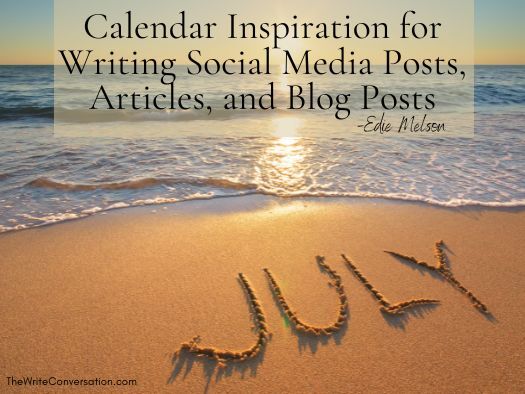
by Edie Melson @EdieMelson
July is just around the corner, so let's get started on writing ideas. The calendar is a great place to start when we’re looking for writing ideas. Crazy (and even legit) holidays are great conversation starters for social media sites, articles, and blogging. This month is especially fun for writers because of all the writing/reading related holidays. How many can you find? Be sure to leave your thoughts in the comment section at the end of the post.
The Month of July IsNational Anti-boredom monthNational Contract Sewing monthNational Grilling monthNational Watermelon MonthWorld Watercolor monthUnlucky Month for WeddingsNational Picnic monthNational Blueberry monthNational Peach monthNational Ice Cream monthIndependent Retailer monthNational Hot Dog monthNational Cell Phone Courtesy monthNational Horseradish monthNational Culinary Arts monthNational Baked Bean month
July Special WeeksBe Nice to Jersey week (first full week in July)National Farriers week (second week in July)National Book Keepers week (starts third Sunday in July)Parenting Gifted Children week (third week in July)Nature the Sunset Week (third week in July)Captive Nations week (third week in July)National Hepatitis awareness week (week of July 28)National Moth week (last week in July)
July Special DaysJuly 1National Creative Ice Cream Flavors DayCanada Day / Dominion DayNational U.S Postage Stamp DayInternational Joke DayNational Gingersnap DayNational Postal Worker Day
July 2National Wildland Firefighter DayNational Anisette DayI forgot DayMade in America DayWorld UFO Day
July 3National Chocolate Wafer DayNational fried Clam DayDisobedience dayStay out of the Sun DayNational Compliment Your Mirror DayNational Eat Your Beans Day
July 4Independence DayAlice in Wonderland DayNational Country Music DaySidewalk Egg Frying DayNational Caesar Salad DayNational Barbecued Spareribs Day
July 5National Play Outside Day (First Saturday of Every MonthNational Hop-A-Park Day (First Saturday in July)International Cherry Pit Spitting Day (First Saturday in July)National Bikini DayNational Hawaii DayNational Graham Cracker dayNational Workaholics DayNational Apple Turnover Day
July 6National Fried Chicken DayBuild a Scarecrow DayInternational Kissing DayNational Hand Roll Day
July 7National Day of Rock 'N RollNational Koi DayNational strawberry Sundae DayGlobal Forgiveness DayChocolate DayNational Macaroni DayNational Father Daughter Take a Walk Day
July 8Cow Appreciation Day (Second Tuesday in July)National Chocolate with Almonds DayNational Freezer Pop DayNational Blueberry DayVideo Games Day
July 9National Sugar Cookie DayNational Dimples DayFashion Day
July 10National Kitten DayChronic Disease DayPick Blueberries DayTeddy Bear Picnic DayNational Clerihew Day
July 11National French Fry Day (Second Friday in July)Collector Car Appreciation Day (Second Friday in July)National Motorcycle Day (Second Friday in July)National 7-Eleven DayAll American Pet Photo DayMake Your Own Sundae DayNational Rainier Cherry DayWorld Population DayNational Cheer Up the Lonely DayNational Blueberry Muffin Day
July 12Paper Bag DayEat Your Jello DayNational Pecan Pie DayNational Simplicity DayNational Different Colored Eyes Day
July 13National Delaware DayNational Beans 'N Franks DayEmbrace Your Geekness DayFool's Paradise DayNational Nitrogen Ice Cream DayOxymoron DayNational Barbershop Music Appreciation Day
July 14National Mac 'N Cheese dayNational Tape Measure DayBarn DayPandemonium DayShark Awareness Day
July 15Social Media Giving DayNational Tapioca Pudding DayNational I Love Horses DayNational Gummi worm DayNational Pet Fire Safety DayBe a Dork DayNational Give Something Away Day
July 16National Hot Dog Day (Third Wednesday in July)Corn Fritters DayFresh Spinach DayNational Cherry DayWorld Snake DayNational Personal Chef Day
July 17National Dole Whip Day (Third Thursday in July)Get to Know Your Customers Day (Third Thursday of each quarter) National Lottery DayNational World Emoji DayNational Yellow Pic DayNational Tattoo DayNational Wrong Way Corrigan DayNational Peach Ice Cream Day
July 18National Sour Candy DayNational Caviar DayNational Tropical Fruit DayWorld Listening day
July 19Toss away the "Could Haves" And "Should Haves" Day (Third Saturday in JulyInternational Retainer DayNational Play DayStick Out Your Tongue DayNational Words with Friends Day
July 20National Ice Cream Day (Third Sunday in July)Ice Cream Soda DayNational Pennsylvania DayNational Moon DaySpace Exploration DayUgly Truck DayNational Fortune Cookie DayNational Lollipop Day
July 21National Get Out of the Doghouse Day (Third Monday in July)National Be Someone DayNational Lamington DayNational Junk Food Day
July 22National Penuche Fudge DayNational Hammock DayNational Mango DaySpoonerism Day
July 23National Lemon DayNational Sprinkle DayNational Vanilla Ice Cream DayGorgeous Grandma Day
July 24National Refreshment Day (Fourth Thursday in July)National Thermal Engineer DayNational Drive-Thru DayNational Cousins DayTell an Old Joke DayNational Amelia Earhart Day
July 25National Get Gnarly Day (Last Friday in July)National Talk in an Elevator Day (Last Friday in July)System Administrator Appreciation Day (Last Friday in July)National Hot Fudge Sundae DayNational Hire a Veteran DayNational Wine and Cheese DayNational Thread the Needle DayNational Merry-Go-Round Day
July 26National Day of the Cowboy (Fourth Saturday in July)National Bagelfest DayNational All or Nothing DayNational Coffee Milkshake DayNational Disability Independence DayNational Auth and Uncle's Day
July 27National Parents' Day (Fourth Sunday in July)National Korean War Veterans Armistice DayNational Creme Brûlée DayTake Your Houseplants for a Walk DayWalk on Stilts DayNational Love is Kind DayNational New Jersey Day
July 28National Waterpark DayBuffalo Soldiers DayNational Milk Chocolate Day
July 29National Chicken Wing DayNational Lipstick DayInternational Tiger DayNational Lasagna Day
July 30National climb a Mountain DayNational Father-in-Law DayNational Whistleblower DayNational Cheesecake DayInternational Day of FriendshipPaperback Book day
July 31National Intern Day (Last Thursday in July)National Chili Dog Day (Last Thursday in July)National Mutt Day (July 31 and December 2)National Avocado DayInternational Lifeguard Appreciation DayNational Raspberry Cake Day
Now it's your turn. What holidays inspire you? Do any of them strike a nerve for marketing or a fun post? Share how you'll use them in the comments section below and inspire us!
Don't forget to join the conversation!Blessings, Edie
If you're interested in doing your own research into holidays, here are several websites to get you started!Brownie Lock: HTTPS://WWW.BROWNIELOCKS.COM/MONTH2.HTMLHoliday Insights: HTTPS://WWW.HOLIDAYINSIGHTS.COM/MOREHOLIDAYS/APRIL.HTMNational Day Calendar: HTTPS://WWW.NATIONALDAYCALENDAR.COM/YEAR-AT-A-GLANCE
TWEETABLEJuly Calendar Inspiration for Writing Social Media Posts, Articles, and Blog Posts @EdieMelson (Click to Tweet)
 Edie Melson is a woman of faith with ink-stained fingers observing life through her camera lens. She’s a writer who feels lost without that device & an unexpected speaker who loves to encourage an audience. She also embraces the ultimate contradiction of being an organized creative. She knows the necessity of Soul Care and leads retreats, conferences & workshops around the world on staying connected to God. Her numerous books, including the award-winning Soul Cares eries & reflect her passion to help others develop the strength of their God-given gifts. Her blog, The Write Conversation is recognized as one of the top 101 industry resources.
Edie Melson is a woman of faith with ink-stained fingers observing life through her camera lens. She’s a writer who feels lost without that device & an unexpected speaker who loves to encourage an audience. She also embraces the ultimate contradiction of being an organized creative. She knows the necessity of Soul Care and leads retreats, conferences & workshops around the world on staying connected to God. Her numerous books, including the award-winning Soul Cares eries & reflect her passion to help others develop the strength of their God-given gifts. Her blog, The Write Conversation is recognized as one of the top 101 industry resources. She and husband Kirk have been married 40+ years and raised three sons. They live in the foothills of the Blue Ridge Mountains and can often be found hiking—with Edie clinging to the edge of a precipice for the perfect camera angle and Kirk patiently carrying her camera bag and tripod. Connect with her on her website, WWW.EDIEMELSON.COM and through social media.
Published on June 29, 2025 22:00
June 28, 2025
Embracing the Rhythm of the Writing Life When Change Hits
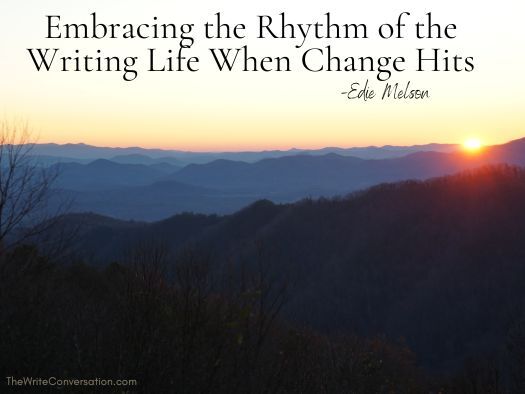 image copyright Edie Melson, Photographyby Edie Melson @EdieMelson
image copyright Edie Melson, Photographyby Edie Melson @EdieMelsonSunsets in the Blue Ridge Mountains are breathtaking.
Sunset and sunrise are always special times for me. There’s a rhythm and a special calm that comes with endings and beginnings. This expected rhythm of life helps me re-center my life to a place of calm. When circumstances are out of control, the fact there is still a normal ebb and flow helps me remember God is always in charge.
Sunset also reminds me there is beauty in change—if we take time to appreciate it. Sometimes we find a poignant clarity that everything has a time and place. These provide a time of reflection—and for me—a time to store up memories and insights from the day. But there’s also a promise in the sunset—a certainty that a new day is coming. This is critical to remember when life changes.
So, what does this have to do with the writing life?
Just like sunrises and sunsets, nothing in the writing world stays the same. People move, companies close or change their focus, trends come and go. Beyond that, I don’t stay the same. My likes, wants, and goals shift. Tragedies and triumphs happen. Each of those experiences changes who I am and how I write.
But full disclosure, I’m not a fan of change, even when it brings good things. Because of that, I try to remember certain things when the clouds of change appear on the horizon of life.
Recently I experienced a change in my own publishing life, the publisher of my last seven books closed. Believe me, that wasn’t a change I was happy about. I wasn’t angry or hurt at the publisher—they were making the best decision for them. But that change threw life into brief chaos. However, even though I didn’t see it at the beginning of the process, that change was God’s best for me too.
When My Writing World Shifts, I Remember These 7 Things
1. God never changes. Hebrews 13:8 reminds us of that. This is the truth I cling to when changes happen. When my publishing world shifts, I go back to the fact that God gifted and called me to write. I retrace my steps and find the foundation of the last thing I know God told me and I follow that direction until He tells me what comes next.
2. However, God does often do new things. Isaiah 43:19 helps us remember that while God never changes, He’s always at work in and around us to do something new-to-us. When God does something new in my life, I try to remember to react with joyful anticipation. God never ambushes us in a bad way. All His work is to bless and make us more like Jesus.
3. Change is hard. Yeah, I don’t have any specific verse for this. Although I do try to remember Jeremiah 29:11 and the fact that God is for me, not against me. I also allow myself to feel the frustration and difficulty of change—but not take up permanent residence there!
4. Change isn’t always bad. Every fiber of my heart know this is true, and yet—to me—change always feels bad. My default reaction to change is a groan and a complaint. I have to make a deliberate effort to remind myself not all change is bad.
5. Change is part of life. Nothing—except God—stays the same. I don't like change, but I know it's coming. And change can often be beautiful—just look at the changing leaves that thrill us every autumn.
6. I do have a choice when change happens. I don’t always have a choice about the thing that is changing, but I do have a choice in how I react. I can choose to trust God and believe He’s going to bring something good out of the change or I can sit in the mud and whine.
7. Change doesn’t have to mean a loss of peace. God’s peace is never dependent on our circumstances. Let me say that again. GOD’S PEACE IS NEVER DEPENDENT ON OUR CIRCUMSTANCES. Yep, God provides peace when the world would believe there couldn’t be peace. That is true in the big stuff, and in the publishing stuff. And that leads us full circle. Having peace in publishing chaos is remembering that God never changes.
I’m still learning to search for the rhythm of life. When I catch sight of it, I often see a hint of the bigger purpose behind the obvious. God is always at work, and time spent in His creation, reminds us of His love, His constant care, and the calm He provides for each of us.
Now it’s your turn. What truths do you remember when writing change happens? Be sure to share your thoughts in the comments section below.
Don’t forget to join the conversation!Blessings, Edie
TWEETABLEEmbracing the Rhythm of the Writing Life When Change Hits from @EdieMelson (Click to Tweet)
 Edie Melson is a woman of faith with ink-stained fingers observing life through her camera lens. She’s a writer who feels lost without that device & an unexpected speaker who loves to encourage an audience. She also embraces the ultimate contradiction of being an organized creative. She knows the necessity of Soul Care and leads retreats, conferences & workshops around the world on staying connected to God. Her numerous books, including the award-winning Soul Cares eries & reflect her passion to help others develop the strength of their God-given gifts. Her blog, The Write Conversation is recognized as one of the top 101 industry resources.
Edie Melson is a woman of faith with ink-stained fingers observing life through her camera lens. She’s a writer who feels lost without that device & an unexpected speaker who loves to encourage an audience. She also embraces the ultimate contradiction of being an organized creative. She knows the necessity of Soul Care and leads retreats, conferences & workshops around the world on staying connected to God. Her numerous books, including the award-winning Soul Cares eries & reflect her passion to help others develop the strength of their God-given gifts. Her blog, The Write Conversation is recognized as one of the top 101 industry resources. She and husband Kirk have been married 40+ years and raised three sons. They live in the foothills of the Blue Ridge Mountains and can often be found hiking—with Edie clinging to the edge of a precipice for the perfect camera angle and Kirk patiently carrying her camera bag and tripod. Connect with her on her website, WWW.EDIEMELSON.COM and through social media.
Published on June 28, 2025 22:00
June 27, 2025
Not Every Quirk Is a Flaw: How to Identify a True Character Flaw in Storytelling
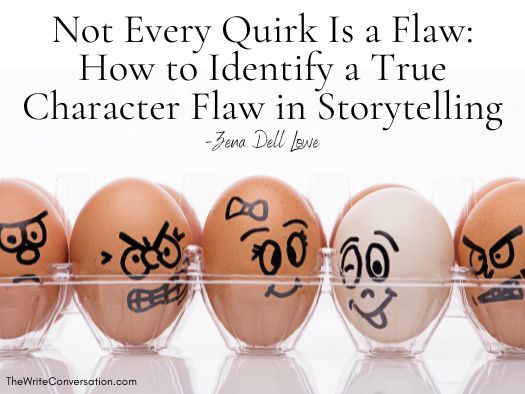
by Zena Dell Lowe @ZenaDellLowe
Writers are often told their protagonist needs a “fatal flaw”—something that must be overcome for growth to happen. But what many don’t realize is this: Not every character trait that causes problems is a flaw that must be fixed.
In fact, mislabeling quirks, wounds, or virtues as flaws can weaken your story. To build authentic, compelling characters and arcs, we need to learn how to tell the difference.
The Fatal Flaw Myth
The term “fatal flaw” gets tossed around like a storytelling essential. It comes from Greek tragedy, where a hero’s flaw—hubris, rage, ambition—brings about their downfall. Modern storytelling borrowed the term but blurred the meaning.
Here’s the problem: writers often conflate very different types of issues and call them all “flaws.” Some common types include:Moral failings – selfishness, pride, cowardiceWounds – unresolved trauma or griefQuirks – bluntness, awkwardness, obsessionVulnerabilities – idealism, honesty, sensitivity
Each of these requires different treatment. Lumping them all together flattens the character and cheapens their arc.
Understanding the Nuance
The problem isn’t that your character has a flaw. It’s not knowing what kind of flaw you’re writing—or whether it’s even a flaw at all. Take the TV character Bosch, for example. He’s obsessive in his pursuit of justice. It costs him—he’s passed over for promotion, alienated from superiors—but it’s also what makes him noble.
So, is it a flaw? No. It’s a moral commitment that exacts a cost. We don’t want him to grow out of it. We want him to stay true to it. That’s what makes him heroic.
Same with traits like honesty, loyalty, emotional sensitivity. They can be risky—even painful—but they’re not something the character necessarily needs to “fix.” Even annoying traits don’t automatically qualify as flaws.
The real question is: Does the trait cause suffering or harm in a way that demands to be addressed for the character to reach their full potential?
Character Trait vs. Character Flaw
Let’s define the difference:A character trait is a consistent way of being that might be inconvenient, awkward, or costly—but isn’t inherently harmful or immoral.A character flaw is a pattern of thought or behavior that causes unnecessary suffering or conflict, either for the character or those around them—and must be confronted for growth to occur.
That’s the difference between a trait that adds texture and a flaw that shapes the arc.
The Real Acid Test: Does It Cause Harm That Must Be Addressed?
Recently, a friend told me I tend to get “teachy” when I’m passionate about a topic. He implied that this dynamic could block connection. I had to ask myself: Is this a real issue? Has this trait damaged my relationships? Or is it just something that rubbed him the wrong way?
That’s the real test. Does this trait consistently cause harm—or is it simply uncomfortable for someone else? We can’t take every critique at face value. The question isn’t, “Did someone object?” It’s, “Is this a pattern that causes real disconnection or harm?”
When Others Project Their Preferences as Flaws
Sometimes people project their discomfort as moral judgment. In life and in fiction, characters are often told:“You’re too intense.”“You care too much.”“You need to let this go.”
But just because a trait is unpopular doesn’t mean it’s wrong. Sometimes, the world is what needs to change—not the character.
That’s not a flaw. That’s a point of tension. And it’s often what makes the story resonate.
Compelling Flaw Characteristics
Here are some characteristics of a compelling, story-worthy flaw:It’s something the character doesn’t see clearly about themselves.It causes real damage or limits their ability to grow.It gets in the way of love, purpose, or redemption.It’s rooted in fear, pride, shame, or a false belief.It creates internal tension that mirrors the external plot.
Think Walter White’s pride (it destroys his family), Tony Stark’s narcissism (it isolates him from real connection), Elsa’s fear of her powers (it causes collateral damage and alienation), or Elizabeth Bennet’s prejudice (it nearly costs her love and happiness).
These flaws must be confronted for the character to step into their fullness.
Letting Traits Be Traits
Not every trait needs to be healed. Not every edge needs sanding down. The goal isn’t to make characters palatable—it’s to make them real. The goal isn’t to fix them—it’s to reveal them. And to let them step into the person they were always meant to be.
Sometimes, we want a character to hold the line, even when it costs them. Bosch doesn’t need to compromise—he needs to persevere. The tension between who he is and what the world demands is the point.
Final Takeaway
Just because a trait causes trouble doesn’t mean it’s a flaw to be fixed. The real question is whether that trait causes harm that must be addressed for the character to grow.
If it doesn’t? If it merely creates friction or heroic struggle without compromising the character’s soul? Then maybe it’s not a flaw at all.
Maybe it’s what makes them unforgettable.
TWEETABLENot Every Quirk Is a Flaw: How to Identify a True Character Flaw in Storytelling from @ZenaDellLowe on @EdieMelson (Click to Tweet)
 Zena has worked professionally in the entertainment industry for over 20 years as a writer, producer, director, actress, and story consultant. Zena also teaches advanced classes on writing all over the country. As a writer, Zena has won numerous awards for her work. She also has several feature film projects in development through her independent production company, Mission Ranch Films. In addition to her work as a filmmaker, Zena launched The Storyteller’s Mission with Zena Dell Lowe, a podcast designed to serve the whole artist, not just focus on craft. In 2021, Zena launched The Storyteller’s Mission Online Platform, where she offers advanced classes and other key services to writers. Zena loves story and loves to support storytellers. Her passion is to equip artists of all levels to achieve excellence at their craft, so that they will truly have everything they need to change the world for the better through story.
Zena has worked professionally in the entertainment industry for over 20 years as a writer, producer, director, actress, and story consultant. Zena also teaches advanced classes on writing all over the country. As a writer, Zena has won numerous awards for her work. She also has several feature film projects in development through her independent production company, Mission Ranch Films. In addition to her work as a filmmaker, Zena launched The Storyteller’s Mission with Zena Dell Lowe, a podcast designed to serve the whole artist, not just focus on craft. In 2021, Zena launched The Storyteller’s Mission Online Platform, where she offers advanced classes and other key services to writers. Zena loves story and loves to support storytellers. Her passion is to equip artists of all levels to achieve excellence at their craft, so that they will truly have everything they need to change the world for the better through story.To find out more about Zena or her current courses and projects, check out her websites at WWW.MISSIONRANCHFILMS.COM and WWW.THESTORYTELLERSMISSION.COM
Published on June 27, 2025 22:00
June 26, 2025
Three Questions Writers Can Ask When Feeling Overwhelmed or Confused
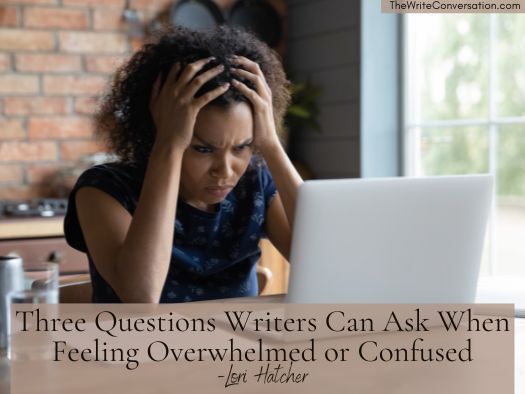
by Lori Hatcher
What should I write today? An article? A blog post? Or maybe a chapter in my WIP?
Maybe I should edit what I’ve already written and polish it for publication.
Should I attend a writers conference this year? If so, which one?
Or maybe I should spend my time and money on an online course or hire a coach.
This fascinating/frustrating/joyful/discouraging/exhilarating/maddening writing world has more arms than an octopus and more routes than Google maps. When we consider the myriad of possibilities, we can become paralyzed by indecision. These feelings cloud our judgment and steal our ability to work efficiently. Like a tornado victim after a storm, we scan the 360 of our writing lives and struggle to figure out where to begin.
One day a woman asked missionary/author/speaker Elizabeth Elliott, “What should I do when I’m overwhelmed with tasks and confused by the decisions I face?”
Elliott wisely remarked, “Just do the next thing.”
What does doing the next thing look like in the writing life?
It requires figuring out what the next thing is. We can do this by asking ourselves a series of questions.
3 Questions to Determine What My “Next Writing Thing” Is
1. Do I have a deadline?
Did I promise someone an article, column, review, or guest blog post? Do I need a piece of writing to bring to a Word Weavers meeting or critique session? Am I under contract for a submission? If yes, then these items should be our “next things.” Write them down and number them in order of deadline priority.
2. If I’m not under a deadline, ask, What action will best move me forward in my writing life?Should I join a critique group for accountability and instruction?Do I need to pull out my idea file, set my bottom in the chair, and write?Should I peruse the Christian Writers Market Guide to find places to submit pieces I’ve already written?Maybe I could advance my writing by reading a few articles to help me overcome one of my writing weaknesses (passive voice, stilted dialogue, or flat characters)?
Once we have our set of action items, we should list them in order based on which activities are likely to deliver the best return on our investment.
3. Are my “next things” truly next things?
When I open my computer in the morning, dings and pings announce that I have email, social media messages, and calendar items waiting.
“Open me!” they cry.
But I must resist. I know I’m most creative in the morning. If I fritter away my creativity on mundane tasks like email and social media, by the time I get around to writing, my creative well is dry. I’ve misspent that day’s allotment of energy.
If, however, I jealously guard those early morning blocks of time and spend them writing, no matter what else happens that day, I’ve done the most important thing.
You may work a day job that limits your writing time. Guard those lunch hours like the Queen’s diamonds. Think about what you’re going to write in advance so you’re ready to go once the lunch bell rings. Or earmark those snatches of time while your toddler sleeps. Or wake up an hour early. Or skip the evening’s TV time. Use your precious minutes to accomplish your most important writing tasks.
Bonus Tip: Avoid letting preference dictate “next things.”
Many writers (my hand is raised) allow preference to dictate which writing tasks we should tackle first. Reworking our latest scene to make it flow better is hard work, but posting on social media is fun. We can’t wait to write that next travel article, but we dread filing our already overdue quarterly sales tax forms. If we follow our hearts, we’ll get stuff accomplished, but it probably won’t be the most important or the most timely item on our list. How about let’s fill out the tax form and THEN write the travel article?
Writer friend, are you feeling overwhelmed and paralyzed by the many steps of this writing journey? If you prayerfully ask God to show you what your “next thing” is, then obey what He tells you to do, He will bless your efforts and take you places you never imagined you would go.
So, writer, let’s do the next thing!
Now it’s your turn. Join the conversation by sharing what your “next writing thing” is in the comments below.
TWEETABLE3 Questions Writers Can Ask When Feeling Overwhelmed or Confused from Lori Hatcher on @EdieMelson (Click to Tweet)
 Lori Hatcher is a freelance editor, writing instructor, and author of six devotionals with Our Daily Bread Publishing. Her latest book, THINK ON THESE THINGS: 60 THOUGHTFUL DEVOTIONS FOR RENEWED PEACE, released this month. Lori writes for Revive Our Hearts, Guideposts, Focus on the Family, The Upper Room, and Crosswalk.com. A frequent instructor at writers conferences around the country, Lori loves nothing better than helping other writers polish and perfect their craft. Connect with her at WWW.LORIHATCHER.COM.
Lori Hatcher is a freelance editor, writing instructor, and author of six devotionals with Our Daily Bread Publishing. Her latest book, THINK ON THESE THINGS: 60 THOUGHTFUL DEVOTIONS FOR RENEWED PEACE, released this month. Lori writes for Revive Our Hearts, Guideposts, Focus on the Family, The Upper Room, and Crosswalk.com. A frequent instructor at writers conferences around the country, Lori loves nothing better than helping other writers polish and perfect their craft. Connect with her at WWW.LORIHATCHER.COM.
Published on June 26, 2025 22:00
June 25, 2025
When We Write Willingly and Watch the Flow of Creativity Follow
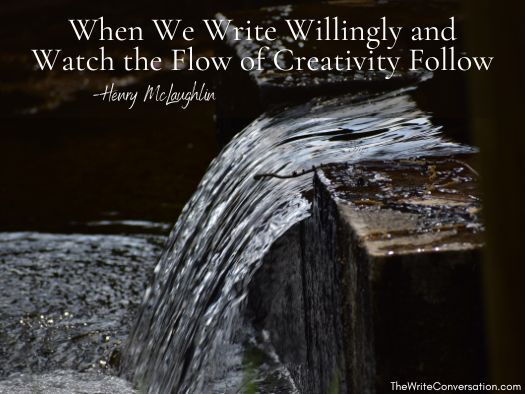
by Henry McLaughlin @RiverBendSagas
Work willingly at whatever you do, as though you were working for the Lord rather than for people. Colossians 3:23 NLT.
Recently, I wrote about a tough time I had with a story. When I finally went to God about it—I stress finally because I would have avoided a whole lot of pain if I’d gone to him before I even started. I ended up tossing that completed manuscript.
My problems happened because I didn’t follow Colossians 3:23. I wasn’t writing for the Lord; I was writing for people. In reality, I was writing to make myself noticed. See how clever I am. See how creative I am. Aren’t these characters outstanding? Don’t these plot twists blow your mind?
I was writing to please people, not God. My motivation was off base—I wrote to bring glory to myself, not him. I worked my butt off on the story. But for all the wrong reasons.
Now, I’m in a season of transition—transformation, actually. Writing is one area God and I are working on together. It’s been a tough process. Sometimes, it feels like the creative well has dried up. Other times, I’ll get an idea and I’ll pursue it for thousands of words, only to scrap it. At first, I didn’t know why.
Now I think I do. Or at least I have a glimmer. Writing has been tough because I need to clean out the garbage I acquired while I wrote the disobedient book. Starting ideas that go nowhere is purging myself of the gunk I let into my mind. I’m not saying what I’m writing now is still disobedient. It’s part of the transformation. I think of it as decluttering. The stories may not get thrown out, but they need to be written in line with what the Father has called me to do.
I don’t know when the creative juices will flow like they used to. That’s not important right now. I need to focus on working for God, not for people. If that means a thousand false starts, so be it. None of the starts is false. All are part of the decluttering of my mind and spirit so I can be faithful. It’s slower than I would like, but I’m not stuck. I’m in the muddle of transformation. No matter how long it takes, I will see it through because I know what’s on the other side will be so much better.
Ask yourself this question: Am I writing as though I’m writing for God rather than people? Spend some time with him and listen for him to speak to you. Please share what you learn in the comments.
TWEETABLEWhen We Write Willingly and Watch the Flow of Creativity Follow from Henry McLaughlin (@Riverbendsagas) on @EdieMelson (Click to Tweet)
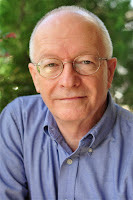 Henry’s debut novel, Journey to Riverbend, won the 2009 Operation First Novel contest.
Henry’s debut novel, Journey to Riverbend, won the 2009 Operation First Novel contest.Henry edits novels, leads critique groups, and teaches at conferences and workshops. He enjoys mentoring and coaching individual writers.
Connect with Henry on his BLOG, X (TWITTER) and FACEBOOK.
Published on June 25, 2025 22:00
June 24, 2025
What Does Passionate about Your Writing Mean?

by DiAnn Mills @DiAnnMills
The writing community is filled with people who are passionate about creating manuscripts that brighten and satisfy a reader’s life. Writers, whose hearts and minds are focused on their calling, have passion for every step in the literary process. These writers are determined to have their work read and appreciated and are unhindered by laboring hours over their craft.
Passionate is often tossed into our vocabulary with distinct and varied meanings:“I’m so passionate about my coffee.”“I’m so passionate about the color blue.”“I’m so passionate about our vacation.”“I’m passionate about gardening.”“I’m passionate about our remodeling project.”“I’m passionate about God.”
What does, “I’m passionate about writing” mean to you?
The Oxford Dictionary defines passionate as: “showing or caused by strong feelings or a strong belief.”
Writers who have strong feelings about writing:()Believe writing is a calling, not a hobby or a job.Experience excitement about a creative project.Dream about what they are writing, either a topic or a story.Practice writing techniques with diligence. Realize writing improves mental, physical, and spiritual well-being through expression.Embrace a love of words. Make sense of the world by writing thoughts and feelings.Find relief from stress and the pressures of the world.Seek satisfaction in the inner longing of their souls.Understand it’s a method of self-care and expression.Expect a lengthy process to learn, write, edit, pray, and repeat.Have a strong conviction about being a part of a large conversation that explores the meaning of life, culture, faith, and society.Write so others can live vicariously through a writer’s life experiences and emotions.
We work alone yet in a community of commitment. Over the years, I’ve collected many quotes reflecting that I’m one of the writers in this treasured conversation.
Quotes that embrace a passionate writer.
“Fill your paper with the breathings of your heart.”—William Wordsworth
“The idea is to write it so that people hear it and it slides through the brain and goes straight to the heart.”—Maya Angelou
“A word after a word after a word is power.”―Margaret Atwood
“Your intuition knows what to write, so get out of the way.”—Ray Bradbury
“If a story is in you, it has to come out.”—William Faulkner
A few of my quotes that express how I feel about writing.
“Knowledge of the craft doesn’t feed anyone until the writer plants the seed.”—DiAnn Mills
“Writing helps us identify and process the emotions we often deny.”—DiAnn Mills
“Don’t be afraid to tackle the tough issues with grace and truth in the pages of a great story.”—DiAnn Mills
“A novel is a living breathing organism. It has the power to entertain, shape, and inspire lives, but a Christian novel does even more. It’s a seed planter to grow believers into the kingdom of God.”—DiAnn Mills
Are you passionate about your writing? Please share in the comments below.
TWEETABLEWhat Does Passionate about Your Writing Mean? thoughts from author @DiAnnMills on @EdieMelson (Click to Tweet)
 DiAnn Mills is a bestselling author who believes her readers should expect an adventure. She creates action-packed, suspense-filled novels to thrill readers. Her titles have appeared on the CBA and ECPA bestseller lists; won two Christy Awards; and been finalists for the RITA, Daphne Du Maurier, Inspirational Readers’ Choice, and Carol award contests.
DiAnn Mills is a bestselling author who believes her readers should expect an adventure. She creates action-packed, suspense-filled novels to thrill readers. Her titles have appeared on the CBA and ECPA bestseller lists; won two Christy Awards; and been finalists for the RITA, Daphne Du Maurier, Inspirational Readers’ Choice, and Carol award contests. She is the former director of the Blue Ridge Mountain Christian Writers Conference, Mountainside Marketing Retreat, and Mountainside Novelist Retreat with social media specialist Edie Melson. Connect here: DIANNMILLS.COM
Published on June 24, 2025 22:00



